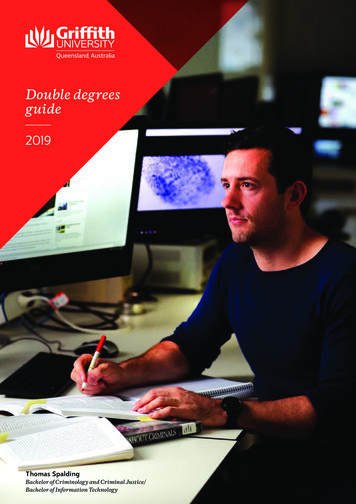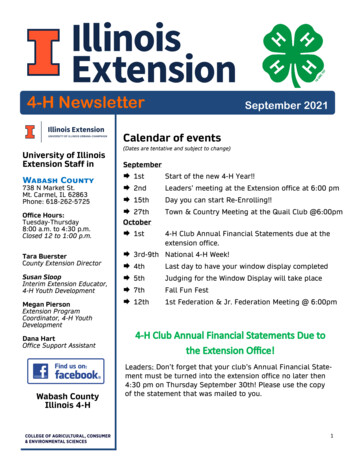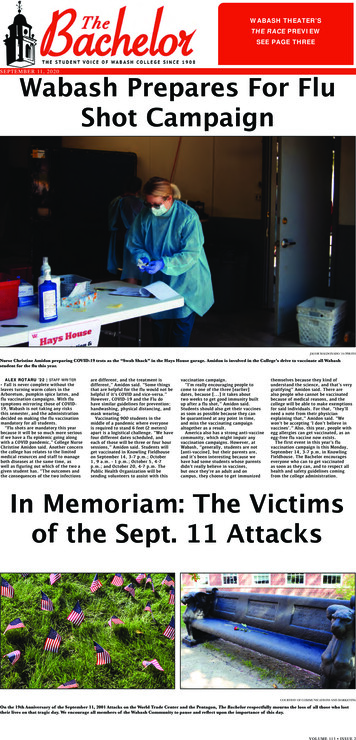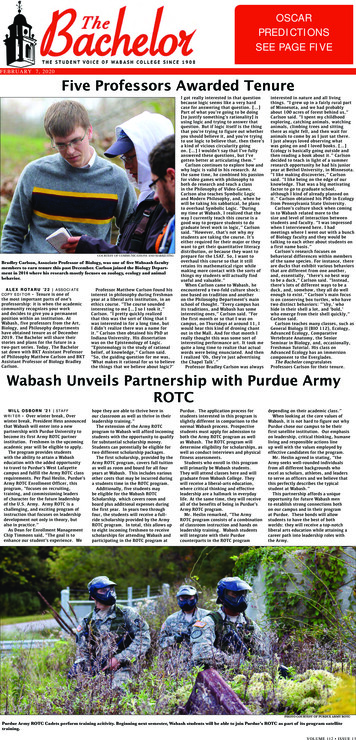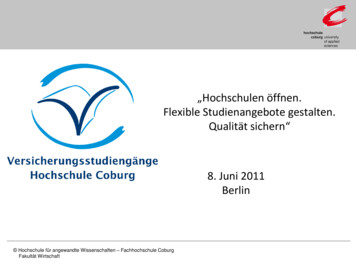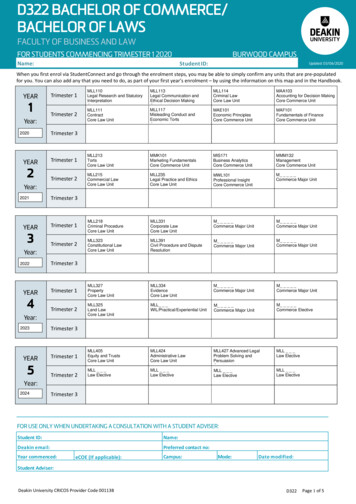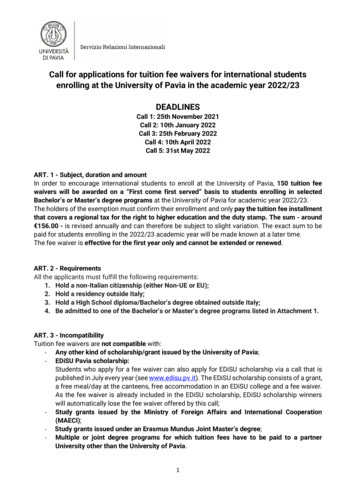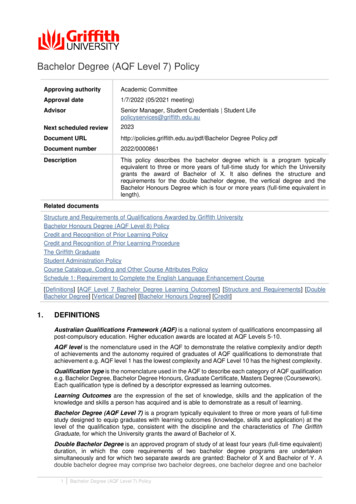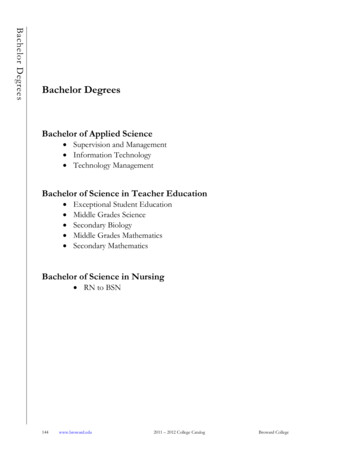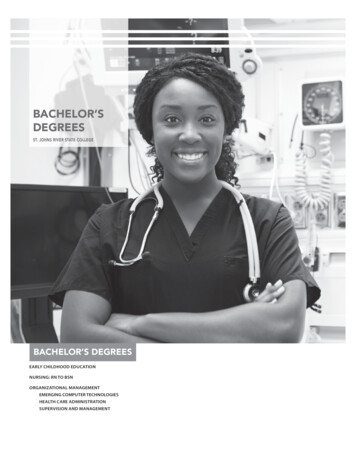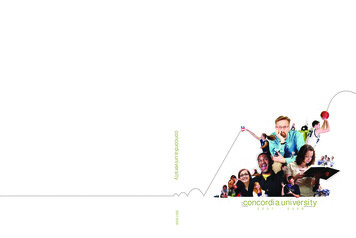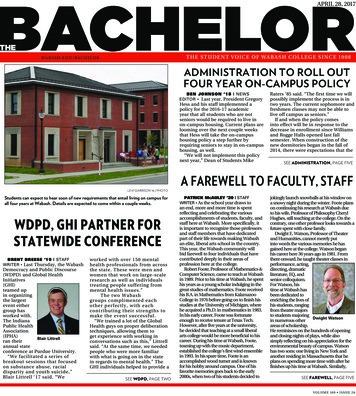
Transcription
BACHELORAPRIL 28, 2017THETHE STUDENT VOICE OF WABASH COLLEGE SINCE 1908WABASH.EDU/BACHELORADMINISTRATION TO ROLL OUTFOUR YEAR ON-CAMPUS POLICYBEN JOHNSON ‘18 NEWSEDITOR Last year, President GregoryHess and his staff implemented apolicy for the 2016-17 academicyear that all students who are notseniors would be required to live inon-campus housing. Current plans arelooming over the next couple weeksthat Hess will take the on-campushousing policy a step further byrequiring seniors to stay in on-campushousing, as well.“We will not implement this policynext year,” Dean of Students MikeLEVI GARRISON ‘18 / PHOTOStudents can expect to hear soon of new requirements that entail living on campus forall four years at Wabash. Details are expected to come within a couple weeks.WDPD, GHI PARTNER FORSTATEWIDE CONFERENCEBRENT BREESE ‘19 STAFFWRITER Last Thursday, the WabashDemocracy and Public Discourse(WDPD) and Global HealthInitiatives(GHI)teamed upin organizingthe largestevent eithergroup hasworked with.The IndianaPublic HealthAssociation(IPHA)Blair Littrellran theirannual stateconference at Purdue University.“We facilitated a series ofbreakout sessions that focusedon substance abuse, racialdisparity and youth suicide,”Blair Littrell ‘17 said. “Weworked with over 150 mentalhealth professionals from acrossthe state. These were men andwomen that work on large-scaleresearch as well as individualstreating people suffering frommental health issues.”The two Wabashgroups complimented eachother perfectly, with eachcontributing their strengths tomake the event successful.“We trained a lot of the GlobalHealth guys on proper deliberationtechniques, allowing them toget experience with working inconversations such as this,” Littrellsaid. “At the same time, we neededpeople who were more familiarwith what is going on in the statein regards to mental health.” TheGHI individuals helped to provide aSEE WDPD, PAGE TWORaters ‘85 said. “The first time we willpossibly implement the process is intwo years. The current sophomore andfreshmen classes may not be able tolive off campus as seniors.”If and when the policy comesinto effect will be in response to thedecrease in enrollment since Williamsand Rogge Halls opened last fallsemester. When construction of thenew dormitories began in the fall of2014, there were expectations that theSEE ADMINISTRATION, PAGE FIVEA FAREWELL TO FACULTY, STAFFPATRICK MCAULEY ‘20 STAFFWRITER As the school year draws toan end, more and more time is spentreflecting and celebrating the variousaccomplishments of students, faculty, andstaff here at Wabash. More specifically, itis important to recognize those professorsand staff members that have dedicatedpart of their life towards making Wabashan elite, liberal arts school in the country.This year, the Wabash community willbid farewell to four individuals that havecontributed deeply in their areas ofprofession here at the college.Robert Foote, Professor of Mathematics &Computer Science, came to teach at Wabashin 1989. Prior to his time at Wabash, he spenthis years as a young scholar indulging in thegreat studies of mathematics. Foote receivedhis B.A. in Mathematics from KalamazooCollege in 1976 before going on to finish hisstudies at the University of Michigan, wherehe acquired a Ph.D. in mathematics in 1983.In his early career, Foote was fortunateenough to receive tenure at Texas Tech.However, after five years at the university,he decided that teaching at a small liberalarts college would be more beneficial to hiscareer. During his time at Wabash, Foote,teaming up with the music department,established the college’s first wind ensemblein 1993. In his spare time, Foote is anaccomplished wood turner and is knownfor his hobby around campus. One of hisfavorite memories goes back to the early2000s, when two of his students decided tojokingly launch snowballs at his window ona snowy night during the winter. Foote planson continuing his research at Wabash dueto his wife, Professor of Philosophy CherylHughes, still teaching at the college. On thecontrary, one other professor looks towards afuture spent with close family.Dwight E. Watson, Professor of Theaterand Humanities, cannot merely putinto words the various memories he hasgained here at the college. Watson beganhis career here 36 years ago in 1981. Fromthere onward, he taught theater classes inperformance, acting,directing, dramaticliterature, EQ, andsenior colloquium.For Watson, histime at Wabash hasbeen dedicated toenriching the lives ofhis students, rangingfrom theatre majorsto students majoringDwight Watsonin numerous otherareas of scholarship.He reminisces on the hundreds of openingand closing nights of plays, while alsosimply reflecting on his appreciation for theenvironmental beauty of campus. Watsonhas two sons: one living in New York andanother residing in Massachusetts that heplans on spending more time with after hefinishes up his time at Wabash. Similarly,SEE FAREWELL, PAGE FIVEVOLUME 109 ISSUE 26
HI-FIVESFIVE THINGS WORTHYOF A HI-FIVE THIS WEEKCOMICAL COMMENTARY?Hi-Five to the Bachelor for once againincorrectly correcting an incorrection in lastweek’s correction’s section of the newspaper.We try very hard to correctly correct ourcorrections, but we needed to provide at leastone bit of good material for the next edition ofthe Commentary. Jeers, ya filthy animals!TRUMP-FREE BAXTERDonald Trump completed his 100th dayin office this week, yet his portrait has notappeared in Baxter 101. Is this Wabash’s wayof saying #notmypresident? Maybe we arewaiting for Trump to be impeached, so wecan get a package deal with a portrait of MikePence. Either Campus Services are waiting untilnext semester, or some faculty are conspiring toturn campus into a Trump-free zone.A UNITED FIASCOHi-Five to United Airlines for refusingto stay out of the news. After their NFLscouting video of dragging a man off theplane surfaced, the world’s largest rabbitpassed away on a United Airlines flightfrom London to Chicago. The airlinecannot catch a break. Maybe one day, theycan obviously, safely fly without threat ofsomething controversial happening.UNISEX BATHROOMS:THE T.P. YOU NEEDOften a subject of scorn in the days of YikYak, the college’s use of single-ply sandpaperin Wabash restrooms is one of the mostunanimously hated topics on campus. If youhave a more delicate rear-end than most, thereis still hope. The handful of bathrooms thathave two-ply toilet paper are among the bestkept secrets at Wabash. However, there is arumor that you can treat yourself to a poopin the uni-sex bathrooms in the Fine Artsbuilding. Your butthole will thank you. Weguarantee it.NO PIZZA, HANK?Hi-five to the Campus to CrawfordsvilleCommittee for blatant false advertisement to thestudents they supposedly serve. Hank Horner ‘18was really desparate to get students to come outfor the second Annual Student Day of Service,so much so, that he offered the student bodyfree pizza! Students were left confused, cold, andtired on the chapel steps after a long morningof philanthropy with no pizza in sight. Seriously,Hank? That’s a new low, man. I guess that’s whatit takes though to get a bunch of poor collegeguys to actually care about the community theylive in; just offer them a free lunch, even if there’sno money in the budget to give them any.2 APRIL 28, 2017 THE BACHELORBACHELORFROM WDPD, PAGE ONEmental health perspective during thediscussion, as well as note-taking.This event was initially plannedsolely for the Wabash GHI,but upon getting more detailsregarding it, Eric Wetzel, NormanTreves Professor of Biology, saw aperfect opportunity to incorporatethe WDPD.“We partnered with them inorder to properly facilitate thediscussion,” Bilal Jawed ‘17 said.“Mental illness is caused by stigmaand fixed with education, so thistype of event is perfect because itwill truly help to raise awarenessand help people.”Each of the two groups would nothave been able to properly run theevent without the help of the other.“It was great for me to be in suchclose proximity to these publichealth leaders.” Jawed said.COMMUNICATIONS & MARKETING / PHOTOWith such a large group and soBilal Jawed ‘17 takes notes duringmany conversations to analyze,facilitations at the IPHA conference.results and conclusions will takesome time. Eventually, the WDPDwill finalize and publish theirreport, which the IPHA will then use create policy,” Jawed said. “Overallas they lobby for better legislationthe deliberation will be greatregarding mental health.for everyone in Indiana because“The IPHA is the chief lobbyingof that.” Specifically for theorganization of its kind in thecollege, the size and gravity of thestate,” Littrell said. “Afterwards,conference helps to showcase thethey will then prepare a policyabilities of Wabash students. “Theyproposal for state and localloved us and really appreciated thelegislators.” We can expectwork we did,” Jawed said.widespread addresses to the issues“Events like this allow us todiscussed during the conference.establish a relationship and createThis was a first for the WDPDopportunities for future events.”and GHI, but also the first studentLittrell said. For example, some ofled deliberation for the IPHA. “Ourthe discussion participants mightlargest event before this was aroundcontact the WDPD to conduct50 or 60 people,” Littrell said. “Todeliberations of this type in thefacilitate a discussion between 150future on a local scale.people is the biggest accomplishmentBilal and Blair would like toof the WDPD. These events fosterthank the WDPD facilitators,new partnerships and relations.”Sara Drury, Assistant ProfessorOverall the WDPD has met greatof Rhetoric and Wetzel, the IPHAsuccess leading deliberations acrossfor their amazing work, and thethe state in places like Gary andchance to use the GHI and WDPD’sSouth Bend.skills to make a difference in the“The ultimate goal here is tolives of all Hoosiers.REILLY ‘18 SET TO TAKE ONROLE AS EDITOR-IN-CHIEFThe Bachelor is pleased to announcethat Joseph Reilly ‘18 will be our nexteditor-in-chief. He will be takingover for Cole Crouch ‘17 during the2017-2018 school year. Reilly startedworking with this paper his freshmanyear, was Cavelife editor for both the2015-2016 and 2016 fall semester, andcopy editor in the spring of 2015. WhileCavelife editor in 2016, he receivedfirst place for “Best Special SectionFront/Cover” and third place for “BestInformational Graphic” from the ICPA.We are looking forward to Joe leadingus to another fun and exciting yearhere at Wabash starting in the fall.301 W. Wabash Ave.,Crawfordsville, IN, 47933EDITOR-IN-CHIEFCole Crouch cacrouch17@wabash.eduNEWS EDITORBen Johnson bdjohnso18@wabash.eduOPINION EDITORAhad Khan aakhan19@wabash.eduSPORTS EDITORTucker Dixon wtdixon19@wabash.eduCAVELIFE EDITORJade Doty jsdoty18@wabash.eduPHOTO EDITORLevi Garrison lbgarris18@wabash.eduCOPY EDITOR, BUSINESS MANAGERBenjamin Wade bcwade17@wabash.eduDELIVERY MANAGERKevin Griffen klgriffe18@wabash.eduThe purpose of the Bachelor is to serve theschool audience, including but not limited toadministrators, faculty and staff, parents, alumni,community members and most importantly,the students. Because this is a school paper,the content and character within will cater tothe student body’s interests, ideas and issues.Further, this publication will serve as a mediumand forum for student opinions and ideas.Although an individual newspaper, the Boardof Publications publishes the Bachelor. TheBachelor and BOP receive funding from theWabash College Student Senate, which derivesits funds from the Wabash College student body.Letters (e-mails) to the editor are welcomedand encouraged. They will only be published ifthey include name, phone, or e-mail, and are notlonger than 1,500 words.The Bachelor reserves the right to edit lettersfor content, typographical errors, and length.All letters received become property of thispublication for the purposes of reprinting and/or redistribution. Profanity may appear in thepublication, but only in cases of direct quote or ifprofanity is necessary to the content of the story.Please do not confuse profanity with obscenity.No article or picture of an obscene nature willappear in this publication.The Bachelor is printed every Thursday atthe Purdue Exponent in West Lafayette. It isdelivered freely to all students, faculty, and staffat Wabash College. All advertising publishedin the Bachelor is subject to an established ratecard. The Bachelor reserves the right to denyrequests for publication of advertisements.Student organizations of Wabash College maypurchase advertisements at half the listed rate.The Bachelor is a member of the Hoosier Stateand Indiana Collegiate Press Associations (HSPAand ICPA).
YEAR REVIEW WITH PRESIDENT HESSCOLE CROUCH ‘17 EDITOR-IN-CHIEF Q : How would you assess this yearfrom your perspective?A : “I’ve enjoyed it a lot. It’s beena busy planning year moving fromthe ad hoc resource planning stagefor the bicentennial to translatingthat to actionable fundraisingefforts. We’ve been talking abouthow many campaigns we want torun over the next 15 years and whatthose might emphasize. It’s beenreally reassuring.Also, we’ve tried to have somegood conversations about fraternitylife at the College. We discussed thenature of fraternities, and how wecan financially support fraternities’structures in a way that alumni cancontinue to support students andthe College.The final big conversationwas how we enjoy our campustime together. It’s a much longerconversation that will go on for awhile that includes everything fromhow we want to park our cars oncampus to how we eat our food atthe college. Also how we want todisperse all the campus activities orspread them out.The best way to headline theyear is it’s been a conversationwhere we’ve begun some bigconversations. Next year we’llcontinue those big conversations.And it runs the whole gamut.Not so much about academiclife because academic life is verysecure here. The other pieces arestrong too, but we have a goodopportunity to reshape how welive together. You don’t always getthat luxury, so we’re trying to makegood use of the time. We do planto wrap them up by the end of thenext academic year.”Q : Do you think the College willlook physically different in 2032?A : “I think what people wouldconsider to be the iconic aspectsof the College will be unchanged.In regards to what happens withSparks, something will eventuallyhappen there. The athletic fields,the mall, and housing will be aboutthe same. And in some ways, we’retrying to work on the adjoiningspaces. Harry Freedman area willprobably change by the time youcome back for your 10th or 20threunion or by the time you comeback for your 15th reunion onthe bicentennial. By the time youcomeback for your 15th reunion,Sparks will have changed. Thequestion will be should we moveeverything into one big Sparks orshould we distribute everythingout, and my guess is that we’llprobably distribute all of it out. Thecommittee is still working on that.”Q : Along with the committees, didyou lead the push for the physicalchanges on campus?A : “Yes, we did. You don’t alwaysget the luxury of thinking abouthow you develop an institutionover time, and the bicentennial isa good way to think about it. Wehave struggled for a while in severalways to talk about how we have ourshared campus life. A lot of thathas to do with food. Right now wehave 11 commercial kitchens wherestudents can’t really substituteacross spaces even if it would beenormously convenient even for ashort period of time. We seem tohave found the most expensive wayto give students the least amountof choice. Ultimately, that’s notwise for institutions. And Sparks isgetting up there in age.”Q : Looking back after four years,how do you feel about your progressand footprint on the College?A : “I feel as though we’ve madea lot of momentum with the thingsthat we care about as a College. Ido occasionally try to reflect on thefour points I came in with. They arestill the same four points.First, I still certainly careabout the value of a Liberal Artseducation. It’s the best educationto have. As you know both mydaughters received very strong andvaluable Liberal Art educations. Iam even more sure it’s the rightthing to do because if you’re soabsolutely set on doing one thing inlife then get a narrow degree. Butas you know, most people will havefive or six different careers, andso it seems entirely contradictoryto base your higher educationexperience learning how to do onething rather than having a broadunderstanding about how to dothings more generally. The Wabasheducation is so valuable to help youmove around.The second point was talkingabout expanding our academicand geographic footprint. TheCollege has expanded its spacegeographically with new housing.We’ve begun conversationsabout space planning. In theco-curricular space, we’ve moveda lot with the Liberal Arts PlusInitiatives, which give guys greatways to apply their Liberal Artsexperiences in ways that havegiven them fantastic experiences.The third leadership point isstill very strong at the College.We’ve discussed a lot of importanttopics at the College. With WabashDemocracy and Public Discourse,we spend a lot of time engagingwith each other and finding waysfor guys to give significant pushesinto things that matter in theirlives. We’re still continuing toincrease our number of leadershipopportunities the College has. Alot of other colleges have a lot ofsharp edges; we have better definedfor ourselves what it means to bea 21st Century man. I think thatcomes from everything like ourconversations about mental healthto conversations through thisuncertain political transition in theU.S. We have been able to navigatethose conversations better thanother colleges not because peopledon’t have strong views, but peoplehave found ways to accommodateeach other in meaningful ways othercolleges should look at.The final point is expandingphilanthropy. The thing aboutbuilding towards a campaign isyou have to announce things atthe right time. We are having goodconversations with the peoplethat make a real difference at theCollege in our ultimate resourceplanning as we go to our 200thanniversary, which will continue tomake the College strong. It won’tnecessarily move the dial today, butit will move the dial in that timeperiod. It’ll secure the economicfoundation of the College. TheDay of Giving is another greatexample of expanding the cultureof philanthropy. We see that peopleunderstand that the College runsprobably 55% on philanthropyevery year. It’s not somethingthat can be lost. The annual fundsupports seven or eight percent ofthe budget. If there were no annualfund, 1 out of 15 employees wouldbe gone. It would be tough to cut 1out of every 15 classes. It’s critical.Our alumni, staff, and studentsall step up and recognize theimportance of giving.So far, so good. Nobody told meit’d be easy, but they did tell me itwould be worth it. And it definitelyhas been worth it to me in my life.Laura and I are all in with Wabash.We’ve done our best to embrace allthe important pieces of Wabash inorder to strengthen the College. Sofar we’re so good, but things canhappen any day, so you have tostay on your toes. We’re staying onour toes.”THE BACHELOR WABASH.EDU/BACHELOR 3
MENTAL HEALTH RECAPCHARLES FREY ‘19 STAFF WRITER The Wabash community has committeditself over the past several months tocreate a group of students and facultyto help engage with mental health oncampus. Finally on March 14 of this year,the Mental Health Concerns Committee(MHCC) was established as an officialpart of the Wabash community. Thecommittee is both innovative instructure and influence, and will surelyspearhead how other campuses cantackle mental wellness in the future.“MHCC is dedicated to ‘Coordinate,Promote, and Communicate Activities toNormalize Emotional Wellness at WabashCollege,’” committee’s mission statementstates. Under this definition, MHCC willact through student leaders in all aspects ofcampus to promote programs and activitiesengaging with positive mental healthawareness. Bilal Jawed, ’17 was the studentfigurehead for the formation of MHCC, andworked closely with these groups to ensurethey were represented. “The problem thatwe’ve had with student groups leadingmental health efforts is that they graduate,”Jawed said. “The faculty keeps us rooted, andthe students are able to drive the initiative.”The end goal is simple: destigmatizemental illness and promote informationabout mental wellness here at Wabash.“We have a fully functioning committee,with leadership, structure, goals, a missionstatement,” Jawed said. “It’s really exciting.”4 APRIL 28, 2017 THE BACHELORClub and organization leaders now havethe opportunity to be involved with thecommittee. Not all student groups are requiredto join the committee, but requests can bemade on behalf of the organization to havea voice. The proposed permanent MHCCmembers include: the chair appointed by theDean of Students, a non-voting representativefrom the counseling center, the Presidentof the Student Senate, and three studentrepresentatives, just to name a few.“It makes me so hopeful,” Jawed said.“Everyone I’ve reached out to, everyone I’veinteracted with has been excited and they’rewanting to help. Faculty, students, everyoneis on board. I’ve even had alums reach outasking to help in any way they can. It makesme proud of our community.”It is easy to think about mental health inthe context of our campus, but what Wabashis doing right now can easily pave the way forother campuses to recreate our structure. “It’simportant here because like any other collegewe have our strains and our stresses,” Deanof Student Michael Raters ‘85, key advisorduring the formation of MHCC, said “Unlikeother colleges, we are all men, which meanswe’re less likely to look for help. Anything thatwe do, we want to be the best there is at it, sowe shouldn’t be afraid to let others see whatwe do and allow them to mimic it.”Be on the lookout next semester forMHCC-sponsored events and rememberto practice mental wellness daily over thesummer months.
FROM FAREWELL, PAGE ONEanother member of the music departmentplans on engaging with family and friendsupon leaving the college.Richard Bowen, Assistant Professor ofMusic and Director of Glee Club, took aunique path towards establishing himselfas a highly-regarded musician. Beforeending up at Wabash, Bowen receivedhis B.A. from Lebanon Valley College, justeast of Harrisburg, Pennsylvania. Afterfinishing his undergraduate, he spentfifteen years teaching music at GardenSpot High School in Pa. However, after histime there, he made a decision to furtherexpand his expertise in the field of music.Bowen went on to receive his Ph.D. fromthe University of Cincinnati. In 2001, he wasemployed as a visiting professor of music,but was asked to help develop Wabash’snow reputable immersion trip program inthe CAE. In the fall of 2004, Bowen took theover as Glee Club director and continuedto teach courses in music. As he ruminateson his career at Wabash, Dr. Bowen fondlyremembers the glee club’s first internationaltour that took them to Wales and Scotland.During this trip, he and 35 Wabash chorusmembers performed alongside the famousall-male choruses of the countries, whomhe looks up to for their pure dedicationand passion for the art. Bowen and hiswife, Eileen Bowen plan to move back toCincinnati in order to devote more time toclose friends and family. Faculty are a hugeFROM ADMINISTRATION, PAGE ONEpart of Wabash, but so are the various otherstaff members that help keep the collegeintact as a business.Larry Griffith will be stepping down asthe college’s chief financial officer at theend of this school year. Before coming toWabash, Griffith received his B.A. fromMount Union College in 1974 and went onto acquire his masters in accounting fromKent State University in 1987. Griffith wasalso an athlete during his undergraduateyears. Upon finishing his studies, he servedas the Vice President of Business Affairsand Treasurer at Mount Union from1982 to 1992. Thereafter, Griffith servedas the Vice President for Finance andOperations at Franklin College in Franklin,Ind. Subsequently, he was named CFO ofWabash on July 1, 2006 and has worked forthe college ever since.Wabash College is a place where peoplerecognize the ability of others to accomplishtheir life goals. These well-establishedmembers of the Wabash community will beremembered for their dedication, service,and progressive attitude in making Wabashone of the best liberal arts schools in thecountry. Their departures should not bringsadness, but rather a sense of joy for allthey have done for this generation and thegenerations of students that have benefittedfrom their insight. In Wabash, thank you tothese faculty and staff members for makingthis college a better place to learn and grow.innovations in residential living wouldattract more prospective students,resulting in a larger student body tolive in those new dorms. Things havenot gone according to plan, however.“There was a pretty goodindication from the admission officethat the quality of our housing wasnot up to par with other institutionsand we were losing students basedon the poor quality of our housing,”Raters said.While it made sense at that pointto move ahead with constructionof more modern residential halls,numbers have actually dropped,leaving numerous dorms empty.In fall 2015, enrollment at Wabashwas at 868 students; now it is justbarely over 800 students. Whilestudent enrollment was on therise up to the installation of newdormitories and the renovation ofMartindale, there are no sure answersas to why the student body has beendecreasing the past few years. Duringthe aftermath of the Great Recessionof 2008, the student body wasconsistently around 900, more or less.During this time, Wabash managedto provide competitive financialaid packages, but it seems as theeconomy has grown, other collegeshave caught up.Ultimately, the new policy torequire all students to live on campuswill be to make efficient use of the 23 million investment in campushousing. The administration hopesthat, eventually, the plan to increasethe student body will come to fruitionand they will be able to roll back thepolicy over time“If we have a greater student bodyand we don’t have the room forhousing, we can certainly roll backthe policy,” Raters said. “But, thebottom line is we’re going to takecare of ourselves, our institution,and our facilities, first.” Over thecoming years, Hess will be playing agame of reeling in and reeling out,trying to find the sweet spot, whereresidential housing is used to itsfull capacity, but also allowing thechoice for upperclassmen to live onor off campus.“The president’s responsibility isto figure out what is the best interestof this institution,” Raters said. “Ithink he is close to figuring somethingout.” While current juniors who aremaking plans to live off-campus nextyear don’t have to worry, currentsophomores and freshmen will haveto wait and see how the fluctuatingenrollment plays out for the rest oftheir time at the College.THE BACHELOR WABASH.EDU/BACHELOR 5
OPINIONTHE BACHELOR EDITORIAL BOARDCOLE CROUCH ‘17EDITOR-IN-CHIEFBEN JOHNSON ‘18NEWS EDITORAHAD KHAN ‘19OPINION EDITORTUCKER DIXON ‘19SPORTS EDITORJADE DOTY ‘18CAVELIFE EDITORLEVI GARRISON ‘18PHOTO EDITORBENJAMIN WADE ‘17COPY EDITORBENJAMIN WADE ‘17BUSINESS MANAGERTHE PATH THAT WILL MAKE ALL THE DIFFERENCEThe other day, I went fora run around campus. Idiscovered for the firsttime in four years a trail that loopsthrough some woods and backaround to campus.A couple days later, still sorefrom the run, I thought about howI am so out of shape cardio-wise asa senior compared to when I wasa freshman. Thank god for BuschLight and unhealthy food. But Ialso thought about how and why itwas possible that in my four yearsat Wabash College I never realizedthat trail existed. As I thought more,other realizations came to my mind.I don’t consider myself a failure,but to an extent, I’ve failed at beingaware of and taking initiative withthe opportunities around me.The more I think about what,when, where, how, and whyI’ve made decisions over thepast four years, I’ve come to anunderstanding that I make decisionsbecause they are apparent. Thechoice is more obvious than not. Inreal time and hindsight, even myIColeCrouch ‘17Reply to this letter atcacrouch17@wabash.edumost complicated decisions seemblack and white.I’ve been aware of my decisionsinsofar as living every day with theresults. I’ve taken initiative, too.I’ve been involved in extracurricularactivities and participatedin classes.I’ve failed to go four years trulybeing aware and taking initiative.I need to be more intentional,deliberate, and critical inmaking decisions.It’s not that I’ve become morecomplacent in college, but I’veonly taken the time when makingchoices to think or act out of mostlymy own concerns guided by mynarrow-minded, selfish streamsof conscience and choice. Andthat’s not failing, but it’s not beingdeliberate or critical. It’sbeing arrogant.I haven’t been aware and takeninitiative of the totally obvious. Thechoice in the decisions I’ve madehas seemed so apparent to me andfor me that I’ve missed out to thinkabout thinking. I’ve decided to becaught up in my decisions that I’vebeen blinded to the possibilities ofother choices. I’ve decided not tobe intentional. I’ve decided before Ieven made my decisions. And that’sbeing absent of all awarenessand initiative.Now until graduation, I haveespecially limited opportunitiesto practice this kind of deliberatedecision-making with regards toWabash. I’ll think about decision,obvious or not, insofar as to becometruly aware. I’ll definitely not takethese fleeting opportunities over thenext two weeks for granted.But beyond graduation, forseniors, we will not get such anarrow window of opportunity tofocus solely on being more aware andtakin
The Bachelor. is printed every Thursday at the Purdue Exponent in West Lafayette. It is delivered freely to all students, faculty, and staff at Wabash College. All advertising published in the Bachelor is subject to an established rate card. The Bachelor reserves the right to deny requests for publication of advertisements.
